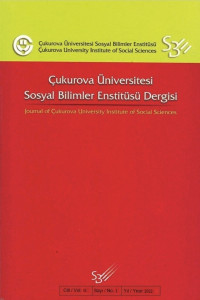Abstract
Bu çalışma, ulusal medya ekosistemleri üzerinde yükselen platform yayıncılığı dönemine dair alternatif bir iletişim ve kültür siyasası modelinin nasıl gelişebileceğini tartışmayı amaçlamaktadır. Karşılaştırmalı bir iletişim ve kültür siyasası analizi ile ekonomi politiğin eleştirisi yöntemlerini kullanan çalışma, Türkiye örneğinde platform yönetişimine dair bir dizi alternatif öneri getirmektedir. Küresel kültürel akış dikkate alındığında, medya ekosisteminin yeni oyun kurucusu olan platformların yerel kültür üreticileri için bir dizi olumlu katkısının olduğunu çözümleyen çalışma içerisinde, küresel ve yerel diyalektiği kültürel akış üzerinden değerlendirilmektedir. Bu doğrultuda çalışma boyunca, çoğulcu ve çok sesli bir iletişim ve kültür politikasının alternatif bir yönetişim eliyle nasıl düzenlenebileceğine dair somut öneriler geliştirilmiştir.
References
- Azzelini, Dario, Greer, Ian ve Umney, Charles (2021). “Why Isn’t There an Uber for Music? The Digitalisation of Intermediaries and the Limits of the Platform Economy”. New Media, Work and Employment. 1-23.
- Behlil, Melis (2021). “Turkish Remakes of Korean Dramas”. Creative Industries Journal. DOI: 10.1080/17510694.20211978690. 1-20. Bennett, Andy (2018). “Youth, Music and DIY Careers”. Cultural Sociology. Vol: 12(2). 133-139.
- Chalaby, K. Jean, Plunkett, Steve (2020). “Standing on the Shoulders of Tech Giants: Media Delivery, Streaming Television an the Rise of Global Suppliers”. New Media & Society. 1-23.
- Chonsong, Wan, Kerry, Lucyann, Marta, Farady Rustona (2021). “Film Distribution by Video Streaming Platforms across Southeast Asia During COVID-19”. Media, Culture & Society. 1-11.
- D’Arma, Alessandro, Raats, Tim ve Steemers, Jeanette (2021). “Public Service Media in the Age of SVODs: A Comparative Study of PSM Strategic Responses in Flanders, Italy and the UK”. Media, Culture and Society. Vol: 43(4). 682-700.
- Davis, Stuart (2021). “What is Netflix Imperialism? Interrogating the Monopoly Aspirations of the World’s Largest Television Network”. Information, Communication and Society. 1-16.
- Dondeers, Karen, Raats, Tim, Komorowski, Marian, Kostovska, Ivana, Tintel Stephanie, Catalina Iordache (2018). Obligations on Demand Audiovisual Media Services Providers to Financially Contribute to the Production of European Works. Brusells: Flanders State of the Art Culture, Youth and Media Department Publications. Ersin, Tuzcu Burcu, Güray, Burcu ve Necipoğlu, Ceylan (2021). OTT Uygulamaları ve Türk Hukukunda Düzenlenmesi. İstanbul: Moroğlu, Arseven Hukuk Bürosu Yayınları.
- European Audiovisual Observatory (2019). Focus: World Film Market Trends (Tendencies Du Marche Mondial Du Film). Brussels: European Audiovisual Observatory Publications.
Abstract
This study has aimed to open a discussion on the possibilities and restrictions of alternative communication and cultural policies under the hegemony of platform broadcasting era which is rising on the national media ecosystems. In this sense, the present study employed a comparative communication and cultural policy analysis and criticism of political economy. After the comprehensive analysis of the opportunities of alternative communication and cultural policy options, the present study offers a number of alternative proposals for platform governance, specifically, in the case of Turkey. Considering the global cultural flow, the present study analyses that the platforms, which are the new playmakers of the media ecosystem, have a number of positive contributions to local cultural producers, and the global and local dialectic is evaluated through the cultural flow. In this direction, concrete suggestions have been developed throughout the study on how a pluralistic and polyphonic communication and cultural policy can be regulated by an alternative governance.
References
- Azzelini, Dario, Greer, Ian ve Umney, Charles (2021). “Why Isn’t There an Uber for Music? The Digitalisation of Intermediaries and the Limits of the Platform Economy”. New Media, Work and Employment. 1-23.
- Behlil, Melis (2021). “Turkish Remakes of Korean Dramas”. Creative Industries Journal. DOI: 10.1080/17510694.20211978690. 1-20. Bennett, Andy (2018). “Youth, Music and DIY Careers”. Cultural Sociology. Vol: 12(2). 133-139.
- Chalaby, K. Jean, Plunkett, Steve (2020). “Standing on the Shoulders of Tech Giants: Media Delivery, Streaming Television an the Rise of Global Suppliers”. New Media & Society. 1-23.
- Chonsong, Wan, Kerry, Lucyann, Marta, Farady Rustona (2021). “Film Distribution by Video Streaming Platforms across Southeast Asia During COVID-19”. Media, Culture & Society. 1-11.
- D’Arma, Alessandro, Raats, Tim ve Steemers, Jeanette (2021). “Public Service Media in the Age of SVODs: A Comparative Study of PSM Strategic Responses in Flanders, Italy and the UK”. Media, Culture and Society. Vol: 43(4). 682-700.
- Davis, Stuart (2021). “What is Netflix Imperialism? Interrogating the Monopoly Aspirations of the World’s Largest Television Network”. Information, Communication and Society. 1-16.
- Dondeers, Karen, Raats, Tim, Komorowski, Marian, Kostovska, Ivana, Tintel Stephanie, Catalina Iordache (2018). Obligations on Demand Audiovisual Media Services Providers to Financially Contribute to the Production of European Works. Brusells: Flanders State of the Art Culture, Youth and Media Department Publications. Ersin, Tuzcu Burcu, Güray, Burcu ve Necipoğlu, Ceylan (2021). OTT Uygulamaları ve Türk Hukukunda Düzenlenmesi. İstanbul: Moroğlu, Arseven Hukuk Bürosu Yayınları.
- European Audiovisual Observatory (2019). Focus: World Film Market Trends (Tendencies Du Marche Mondial Du Film). Brussels: European Audiovisual Observatory Publications.
Details
| Primary Language | Turkish |
|---|---|
| Journal Section | Makaleler |
| Authors | |
| Publication Date | April 30, 2022 |
| Submission Date | December 22, 2021 |
| Published in Issue | Year 2022 Volume: 31 Issue: 1 |


